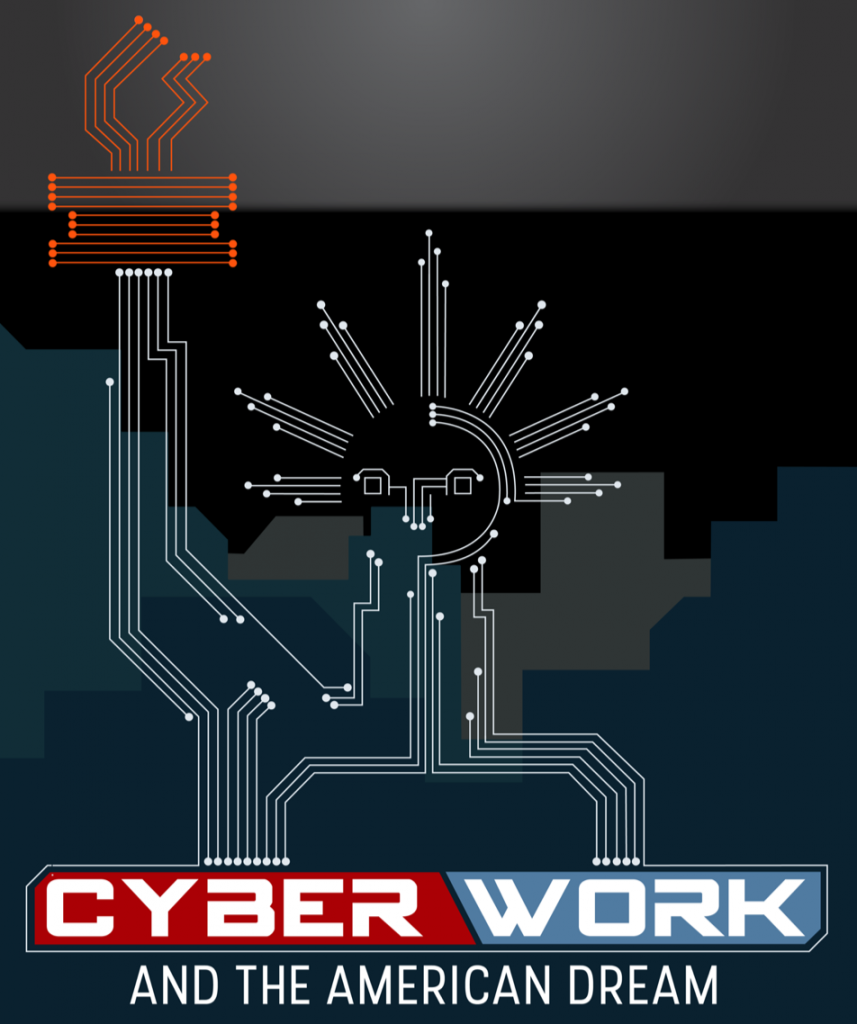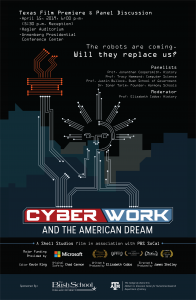A new revolution: Artificial Intelligence and the future of work
A Q&A with history professor Elizabeth Cobbs in anticipation for the screening event on April 15 of her new documentary, CyberWorks and the American Dream.

Is Artificial Intelligence coming for human jobs?
That seems to be the big question of our day, and history professor Elizabeth Cobbs endeavored to explore it further. Cobbs wrote and co-produced the new documentary, CyberWork and the American Dream, debuting this month. This film looks at the history of technology and the future of work, and features the expertise of prominent tech entrepreneurs, historians, economists, and technology experts.
The film will premiere at Texas A&M University on April 15th at 6 p.m. at the Bush School’s Hagler Auditorium, and is free and open to the public. The screening will be followed by a interdisciplinary panel discussion with experts from Texas A&M.
In anticipation of this event, Cobbs answered a few questions about the documentary and the subject of Artificial Intelligence.
Q&A With Elizabeth Cobbs
“Our objective is show how history can help us prepare for the future. I hope people will walk away from this film less scared of technology–but also more committed to getting ready for the extraordinary challenges ahead.”
1. What is the objective of this documentary?
Our objective is show how history can help us prepare for the future. We’ve been through big disruptions before. For example, mechanization of farming pushed people off the land and into industrial jobs. It was hard, and at times caused tremendous suffering, but we figured it out and became wealthier overall. I hope people will walk away from this film less scared of technology–but also more committed to getting ready for the extraordinary challenges ahead. We hope they’ll also walk away understanding both the potential and limits of Artificial Intelligence.
2. What is your background in this area of study?
I teach world history at A&M. One of the biggest questions we try to answer is why the Industrial Revolution broke out in England when it did and spread to the United States after centuries of humanity living at such a rudimentary level. How did we get to the point where most families could have children with the expectation that none would die in infancy? The change was transformative. I also wrote about this in my book American Umpire–the values that spread worldwide, stimulated technological development, and put money in all our pockets.
3. Why did you choose to write and produce a documentary about Artificial Intelligence?
All of us have seen the scary movies that show Artificial Intelligence turning on us and destroying our world–from Frankenstein to The Matrix. We’ve read the dystopian stories of a world where technology allows some people to live very well while others starve (think Hunger Games). But history books show that a different path is possible, especially if we respond in time. In the past, we rose to the epic challenges posed by radical new technologies and we can do so again.
4. Do you believe the changes in technology we are seeing today has a “revolution” potential, as seen in history?
Desperate people do desperate things. They have throughout history. Currently, we’re seeing a rise in authoritarian rule around the world. That’s a dangerous tendency we must take seriously if we want to sustain the peace and prosperity that we’ve enjoyed since the end of World War II.
5. Are “critical thinking” degrees and jobs — like many found in the Liberal Arts — safer than others from replacement by AI?
Absolutely. In our film, tech entrepreneur Mark Cuban (whose wife is an Aggie!) says we’re going to need more rather than fewer liberal arts graduates. Computers will gobble up jobs that rely upon computation faster than jobs that require human judgement, introspection, ingenuity, and “heart.”
6. Why is this an important topic for people to know and discuss now?
The robots really ARE coming for our jobs–and soon. People are already being replaced and they need to figure out how to adjust. From historical precedent, we know for a certainty that most jobs that exist today won’t exist in a few decades. How do we get ready? As Astro Teller of Google says in the film, getting ready is the difference between “riding the wave” and drowning in it.
Watch the trailer and get tickets for the CyberWorks and the American Dream event here.

